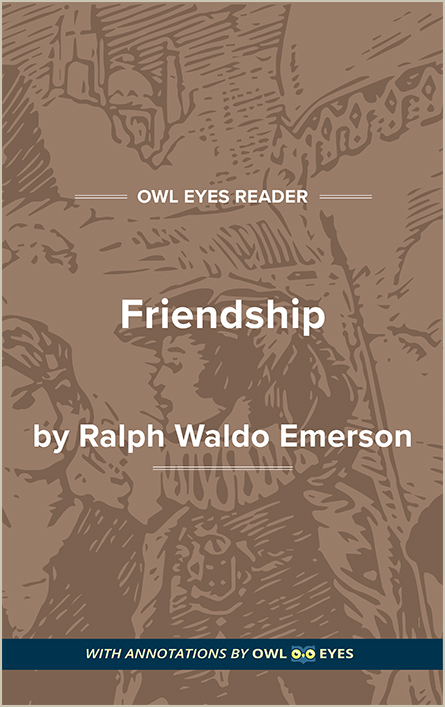Analysis Pages
Metaphor in Friendship
Nature-based Metaphors and Similes: Emerson is known for including a significant amount of nature-based images, metaphors, and similes in his essays and lectures in order to convey his message. He compares the process of building a friendship to the process of naturlangsamkeit, the slow-moving growth of nature, to illustrate how friendships should develop at the same speed. He further explains that while a friendship must be delicate, it must also be solid. Once a friendship has undergone this long, time-consuming process, it should be as rigid as a diamond. Finally, Emerson uses natural imagery to demonstrate what a friend should be: a nettle instead of an echo. Friendship succeeds when two friends do not imitate one another, but have their own set of convictions and sense of autonomy.
Metaphor Examples in Friendship:
"Friendship"
🔒"It never troubles the sun that some of his rays fall wide and vain into ungrateful space, and only a small part on the reflecting planet...." See in text ("Friendship")
"whisper of the gods..." See in text ("Friendship")
"perfect flower..." See in text ("Friendship")
"The hues of the opal, the light of the diamond, are not to be seen if the eye is too near...." See in text ("Friendship")
"Leave to the diamond its ages to grow, nor expect to accelerate the births of the eternal..." See in text ("Friendship")
"Better be a nettle in the side of your friend than his echo...." See in text ("Friendship")
"dial in the shade. In the sun it will mark the hour...." See in text ("Friendship")
"Do not mix waters too much...." See in text ("Friendship")
"we cannot forgive the poet if he spins his thread too fine..." See in text ("Friendship")
"It must plant itself on the ground, before it vaults over the moon...." See in text ("Friendship")
"But to most of us society shows not its face and eye, but its side and its back. ..." See in text ("Friendship")
"undermost garments of dissimulation, courtesy, and second thought, which men never put off, and may deal with him with the simplicity and wholeness with which one chemical atom meets another...." See in text ("Friendship")
"bower..." See in text ("Friendship")
"glass threads or frostwork..." See in text ("Friendship")
"naturlangsamkeit..." See in text ("Friendship")
"tough husk..." See in text ("Friendship")
"the very flower and aroma of the flower of each of the beautiful natures disappears as they approach each other...." See in text ("Friendship")
"We snatch at the slowest fruit in the whole garden of God, which many summers and many winters must ripen. ..." See in text ("Friendship")
"a texture of wine and dreams, instead of the tough fibre of the human heart...." See in text ("Friendship")
"Only the star dazzles; the planet has a faint, moon-like ray...." See in text ("Friendship")
"Shall we fear to cool our love by mining for the metaphysical foundation of this Elysian temple?..." See in text ("Friendship")
"Yet the systole and diastole of the heart are not without their analogy in the ebb and flow of love...." See in text ("Friendship")
"the joy ends in the day; it yields no fruit..." See in text ("Friendship")

